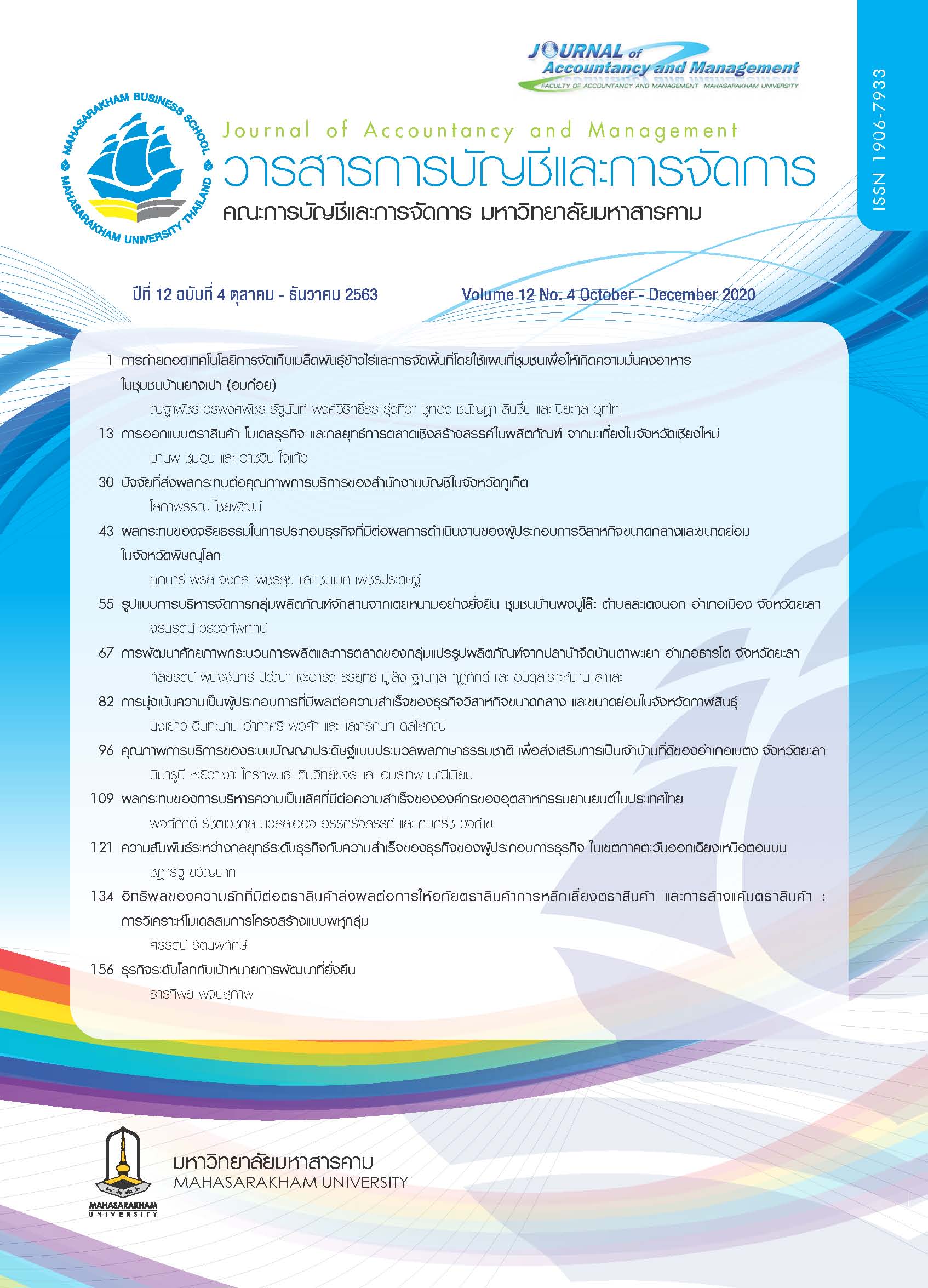คุณภาพการบริการของระบบปัญญาประดิษฐ์แบบประมวลผลภาษาธรรมชาติ เพื่อส่งเสริมการเจ้าบ้านที่ดีของอำเภอเบตง จังหวัดยะลา
Main Article Content
บทคัดย่อ
งานวิจัยนี้มีวัตถุประสงค์เพื่อประเมินคุณภาพการบริการของระบบปัญญาประดิษฐ์แบบประมวลผลภาษาธรรมชาติเพื่อส่งเสริมการเจ้าบ้านที่ดีของอำเภอเบตง จังหวัดยะลาโดยเก็บรวบรวมข้อมูลจากกลุ่มตัวอย่างที่เป็นนักท่องเที่ยวชาวไทยในอำเภอเบตง จังหวัดยะลา จำนวน 384 คน เครื่องมือที่ใช้ในการวิจัย คือแบบประเมินคุณภาพการบริการ โดยดำเนินการเก็บรวบรวมข้อมูลคุณภาพการบริการที่คาดหวังและคุณภาพการบริการที่รับรู้ ผลการวิจัยพบว่า ระบบปัญญาประดิษฐ์แบบประมวลผลภาษาธรรมชาติ มีคุณภาพการบริการที่รับรู้ ( = 4.55, s.d =.125) และคุณภาพการบริการที่คาดหวัง ( = 4.49, s.d =.130) อยู่ในระดับมากที่สุด เมื่อพิจารณารายด้านพบว่า อันดับหนึ่งคือ ด้านการเอาใจใส่มีคุณภาพการบริการที่รับรู้อยู่ในระดับมากที่สุด มีค่าเฉลี่ยสูงสุด ( = 4.70, s.d =.255) คุณภาพการบริการที่คาดหวังอยู่ในระดับมากที่สุดเช่นเดียวกัน ( = 4.70, s.d =.253) อันดับสองคือ ด้านการรับประกัน มีคุณภาพการบริการที่รับรู้อยู่ในระดับมากที่สุด มีค่าเฉลี่ยสูงสุด (= 4.61, s.d =.256) คุณภาพการบริการที่คาดหวังอยู่ในระดับมากที่สุดเช่นเดียวกัน ( = 4.62, s.d =.260) อันดับสามคือ ด้านสิ่งที่สัมผัสได้ คุณภาพการบริการที่รับรู้อยู่ในระดับมากที่สุด มีค่าเฉลี่ยสูงสุด ( = 4.60, s.d =.343)คุณภาพการบริการที่คาดหวังอยู่ในระดับมากที่สุดเช่นเดียวกัน ( = 4.36, s.d =.377) และเมื่อทดสอบความแตกต่างของคุณภาพการบริการที่รับรู้และกับคุณภาพการบริการที่คาดหวังพบว่าด้านสิ่งที่สัมผัสได้ ด้านความน่าเชื่อถือมีคุณภาพการบริการที่รับรู้และคุณภาพการบริการที่คาดหวังแตกต่างกันอย่างมีนัยสำคัญทางสถิติที่ระดับ .05และคุณภาพการบริการด้านการตอบสนอง ด้านการรับประกัน ด้านการเอาใจใส่มีคุณภาพการบริการที่รับรู้และคุณภาพการบริการที่คาดหวังไม่แตกต่างกัน
Downloads
Article Details
บทความที่ได้รับการตีพิมพ์เป็นลิขสิทธิ์ของวารสารการบัญชีและการจัดการ
ข้อความที่ปรากฏในบทความแต่ละเรื่องในวารสารวิชาการเล่มนี้เป็นความคิดเห็นส่วนตัวของผู้เขียนแต่ละท่านไม่เกี่ยวข้องกับมหาวิทยาลัยมหาสารคาม และคณาจารย์ท่านอื่นๆในมหาวิทยาลัยฯ แต่อย่างใด ความรับผิดชอบองค์ประกอบทั้งหมดของบทความแต่ละเรื่องเป็นของผู้เขียนแต่ละท่าน หากมีความผิดพลาดใดๆ ผู้เขียนแต่ละท่านจะรับผิดชอบบทความของตนเองแต่ผู้เดียว
เอกสารอ้างอิง
กระทรงการท่องเที่ยวและกีฬา. (2558). ยุทธศาสตร์การท่องเที่ยวไทย พ.ศ. 2558 – 2560. กรุงเทพฯ : กระทรวงการท่องเที่ยว
จิรัฐ ชวนชม, นงลักษณ์ โพธิ์ไพจิตร, ชิดชม กันจุฬาและพัชรพงศ์ ชวนชม. (2560). คุณภาพการบริการคือความคาดหวังของลูกค้า. วารสารบัญชีและการจัดการ มหาวิทยาลัยมหาสารคาม, 9(2), 1-15
ณัฐชฎา พิมพาภรณ์, เพียร โตท่าโรง, วันทนา สุขอนุเคราะห์, ทับทิม สรวงสิริ, และธารารัตน์ บุญรอด. (2561). การศึกษาคุณภาพการบริการของศูนย์บริการรถยนต์ด้วยแบบจำลอง SERVQUAL. ในรายงานสืบเนื่องจากการประชุมวิชาการ “วิถีนวัตกรรมไทยด้วยการพัฒนางานวิจัย”. ระหว่างวันที่ 1-2 ธันวาคม 2561, กาญจนบุรี : มหาวิทยาลัยเวสเทิร์น.
ประสพชัย พสุนนท์. (2558). ความเที่ยงตรงของแบบสอบถาม สำหรับงานวิจัยทางสังคมศาสตร์. วารสารสังคมศาสตร์ มหาวิทยาลัยศรีนครินทรวิโรฒ, 18(1), 375-396
พิพัฒน์ รัชกิจประการ. (2562). เปิด Home lodge รองรับนักเดินทางสร้างกระแสท่องเที่ยวชุมชน. ค้นเมื่อ 5 มีนาคม 2563 จาก https://www.mots.go.th/News-view.php?nid=12336
มารยาท โยทองยศ และปราณี สวัสดิสรรพ์. (2559). การกำหนดขนาดของกลุ่มตัวอย่างเพื่อการวิจัย [ออนไลน์]. ค้นเมื่อ 14 พฤษภาคม 2562, จาก http://www.fsh.mi.th
มฑุปายาส ทองมาก. (2559). ระบบสารสนเทศเพื่อการจัดการ การจัดการความท้าทายในยุคดิจิทัล. พิมพ์ครั้งที่ 1. กรุงเทพฯ : โรงพิมพ์มหาวิทยาลัยธรรมศาสตร์
เศรษฐพงค์ มะลิสุวรรณ . (2560). Introduction to Artificial intelligence ปัญญาประดิษฐ์. [ออนไลน์]. ค้นเมื่อ 20 สิงหาคม 2562, จาก https://www.nbtc.go.th/
อรรจน์ สีหะอําไพ. (2562). คุยเรื่องเซอร์วิส ว่าด้วยจิตบริการ [ออนไลน]. ค้นเมื่อ 8 กรกฎาคม 2562, จาก www.human.bsru.ac.th
Araujo, T. (2018). Living up to the chatbot hype : The influence of anthropomorphic design cues and communicative agency framing on conversational agent and company perceptions. Computers in human behavior. Advance online publication.
Awoke, H. M. (2015). Service quality and customer satisfaction: Empirical evidence from saving account customers of Banking industry. European journal of business management, 7(1), 144-165
Chandraa, Y. W., & Suyanto, S. (2019). Indonesian Chatbot of University admission using a question answering system based on sequence-to-sequence model. In Proceeding 4th International conference on computer science and computational intelligence 2019 (ICCSCI), Indonesia 12-13 September 2019
Dahiya, M. (2017). A Tool of conversation : chatbot. International journal of computer sciences and engineering, 5(5), 158-161
Dickman, C.R. (1996). Overview of the Impacts of feral cats on Australian native Fauna. Australian nature conservation Agency.
Hossain, M. J. (2012). Impact of service quality on customer satisfaction : A case of tourism industry in Bangladesh. International journal of research in finance & marketing, 2(2), 1-25.
Khalifa, M., & Vanessa, L. (2003). Determinants of satisfaction at different adoption stages of internet-based services. Journal of the association for information systems, 4(1), 206-232.
Kumar, T.R., Abinaya, K., Vasikaran, R., Sindhu, S., & Sivakumarn, D. (2020). An AI Based Chat-Bot for Providing Health Services. Test Engineering & Management. Mattingly publishing Co., Inc.
McTear, M., Callejas, Z., & Griol, D. (2016). The conversational interface: Talking to smart devices. Springer international publishing.
Nica, L., Tazl, O. A., & Wotawa, F. (2018). Chatbot‐based tourist recommendations using model‐based reasoning. In Proceedings of the 20th International configuration workshop. Australia, 25-30.
Parasuraman, A., Zeithaml, V. A., & Malhotra, A. (2005). ES-QUAL: A multipleitem scale for assessing electronic service quality. Journal of service research, 7(3), 213-233
Parasuraman, A., Zeithaml, V. A., & Berry, L. L. (1985). A Conceptual model of service quality and Its implications for future research. Journal of marketing, 49(4), 41-50
Przegalinska, A., Ciechanowski, L., Stroz, A., Gloor, P., & Mazurek, G. (2013). In bot we trust: A new methodology of chatbot performance measures. Business horizons, 62(6), 785-797.
Radziwill, N. M., & Benton, M. C. (2017). Evaluating quality of chatbots and intelligent conversational agents. arXiv Prepr 2017; arXiv : 1704
Rouf, A., Babu, A., Khatun, A., & Kumar, R. A. (2019). Measuring customer’s satisfaction level and service gap between bKash and rocket in Bangladesh. American journal of marketing research, 5(2), 29-35.
Titu, M. A., Raulea, A.S., & Titu, S. (2016). Measuring service quality in tourism industry. Procedia-Social and behavioral sciences, volume 221, 294-301. on May 18, 2019. retreived from ww.sciencedirect.com
Torres, A. M. (2018). Using a smartphone application as a digital key for hotel guest room and its other app features. International journal of advanced science and technology, 113, 103-112.
Tyrpak, M. (2015), “Beating the market: what are clients really asking you?”, Journal of Financial service professionals, 69(4),14-16.
Zlatanov, S., & Popesku. (2019). Current Applications of Artificial Intelligence in Tourism and Hospitality. In Proceeding International scientific conference on information technology and data related research (Sinteza2019), Serbia, 84-90.


